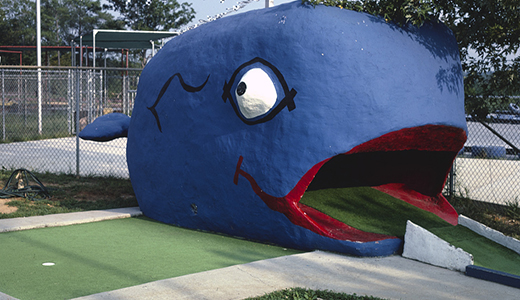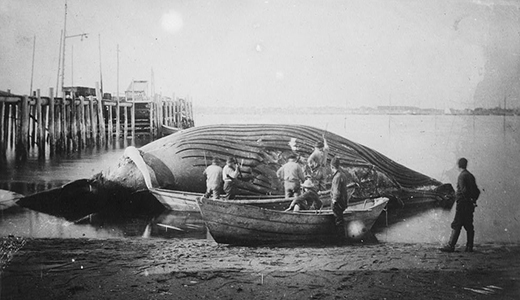 2020
2020
The whale hole at Sir Goony Golf in Chattanooga, Tennessee, 1986. Photograph by John Margolies. Library of Congress, Prints and Photographs Division, John Margolies Roadside America photograph archive.
When an empty Dutch metro train lost control on its elevated tracks near Rotterdam in early November, it did not crash into the ground below but slid onto the tail of a thirty-foot whale, saving the conductor. The plastic sculpture shocked all—including its creator, Maarten Struijs—by being sturdy enough to stop a moving train.
Agence France-Presse reported that the windy weather could make it difficult to remove the train from its new pedestal, although Strujis notes that the accident scene looks like a work of art itself.
“The metro went off the rails and it landed on a monument called Saved by the Whale’s Tail. So that literally happened,” Carly Gorter of the Rijnmond regional safety authority told AFP.
“Because of the whale’s tail the driver actually was saved, it’s incredible.”
The driver was later held for questioning, the safety authority said. The cause of the crash was still being investigated.
The sculpture was built around twenty years ago in a park underneath the raised metro, its name a deliberate play on the fact that it is a “tail track” at the end of the line.
It features two large whale tails poking out of the water, one of which saved the train.
A team of experts, including the architect of the sculpture, was now on site to work out how to safely remove the train.
“The problem is it’s water around it, so a crane isn’t able to get there,” said Gorter.
 1891
1891
Cutting up a blue whale, c. 1900. Library of Congress, Prints and Photographs Division.
At the end of the nineteenth century, newspapers across the world printed the story of sailor James Bartley, said to have been lost after his ship Star of the East was attacked by a sperm whale near the Falkland Islands. The sailors were thrown into the ocean and left fending for their lives as the whale swam off. Thirty-six hours later the crew noticed a dead whale and ascended upon it to harvest its fat. While butchering it, they were shocked to find their friend alive inside. The story was widespread but also, of course, likely not true—merely one of many tales told across the years that echo the story of the Bible’s Jonah, who managed to survive after becoming a whale’s accidental meal. The Star of the East was not a whaler, and no man named James Bartley seems to have been on board. Twenty-first-century scientists think that a whale would most likely just spit a human out; anyone who miraculously made it down a gullet would suffocate. Here is one account of the “Modern Jonah,” from the Great Yarmouth Mercury in England and reprinted in California’s Colusa Daily Sun.
Bartley’s skin, where it was exposed to the action of the gastric juices, underwent a striking change. His face and hands were bleached to a deathly whiteness, and the skin was wrinkled, giving the man the appearance of having been parboiled. Bartley affirmed that he could probably have lived inside of his house of flesh until he starved, for he lost his senses through fright and not through lack of air. He says that he remembers the sensation of being lifted into the air by the nose of the whale and of falling into the water. Then there was a fearful rushing sound, which he believed to he the beating of the water by the whale’s tail. Then he was encompassed by a fearful darkness, and he felt himself slipping along a smooth passage of some sort that seemed to move and carry him forward. This sensation lasted but an instant. Then he felt that he had more room. He felt about him, and his hands came in contact with a yielding, slimy substance that seemed to shrink from his touch. It finally dawned on him that he had been swallowed by the whale…Death stared him in the face, and he tried to look at it bravely, but the awful quiet, the fearful darkness, the horrible knowledge of his environment, and the terrible heat finally overcame him, and he must have fainted, for he next remembered being in the captain’s cabin.